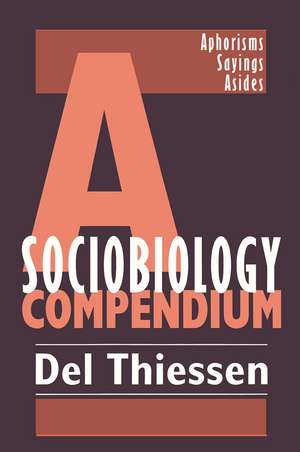A Sociobiology Compendium: Aphorisms, Sayings, Asides
Autor Del Thiessenen Limba Engleză Paperback – 29 ian 2018
| Toate formatele și edițiile | Preț | Express |
|---|---|---|
| Paperback (1) | 198.45 lei 6-8 săpt. | |
| Taylor & Francis – 29 ian 2018 | 198.45 lei 6-8 săpt. | |
| Hardback (1) | 458.78 lei 6-8 săpt. | |
| Taylor & Francis – 30 apr 1997 | 458.78 lei 6-8 săpt. |
Preț: 198.45 lei
Nou
Puncte Express: 298
Preț estimativ în valută:
37.99€ • 41.27$ • 31.93£
37.99€ • 41.27$ • 31.93£
Carte tipărită la comandă
Livrare economică 21 aprilie-05 mai
Preluare comenzi: 021 569.72.76
Specificații
ISBN-13: 9781138507302
ISBN-10: 113850730X
Pagini: 162
Dimensiuni: 152 x 229 mm
Greutate: 0.45 kg
Ediția:1
Editura: Taylor & Francis
Colecția Routledge
Locul publicării:Oxford, United Kingdom
ISBN-10: 113850730X
Pagini: 162
Dimensiuni: 152 x 229 mm
Greutate: 0.45 kg
Ediția:1
Editura: Taylor & Francis
Colecția Routledge
Locul publicării:Oxford, United Kingdom
Cuprins
Preface: Our Genetic Beginnings Introduction: Culture is in Our Evolution; The Nature of Man; Romantic Love, Passion, and the Price of Reproduction; The Dark Side of Human Nature; The Duality of the Human Brain; The Historical Depth of Culture; Creativity and the Pain of Self-Discovery; Masters of Death, Trying to Go Beyond the Genes, Epilogue: The Depth of Our Knowledge, Bibliography: References to Our Past
Descriere
For the past twenty to thirty years, control theories of crime have been at the center of theoretical development in criminology. Key to the control theory perspective is the notion that crime is an inherently individual act, and its explanation requires that we focus on the characteristics of individuals who commit crimes. Consequently, control theory focuses on such issues as self-control and social control.The contributions to this volume explicate and extend the application of control theory. It is divided into three general areas. Part 1 focuses on key assumptions and components of control theories. Contributors discuss the notion of learning, or socialization, in the context of control theory and the effects that families, peers, and the criminal justice system have on self-control, social ties, and criminal behavior. Part 2 applies control theory to areas typically assumed to be out of the domain of self-control theory and social control theory, such as gender differences in crime, domestic violence, and group crime. Considering control theory's emphasis on explaining individual criminal acts, these chapters suggest an interesting area of development by highlighting the possibility that differences in crime across or within groups may begin with individual characteristics and then making inferences about groups and group processes.Part 3 approaches the explanation of crime cross-nationally and at the macro-level. Although the authors take different approaches, they all illustrate that a theory of crime does not require culture-specific elements in order to be a valid cross-cultural explanation. Contributors to this volume include: Robert Agnew, Todd Armstrong, Leana Allen Bouffard, Augustine Brannigan, Chester Britt, Barbara Costello, Maja Dekovic, Matt DeLisi, Michael Gottfredson, Henriette Haas, Kelly H. Hardwick, Travis Hirschi, Marianne Junger, Martin Killias, Helen Mederer, Kevin Thompson, and Alexander Vazsonyi.
